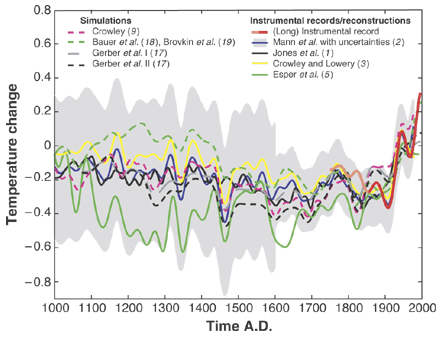From the comments, jfs says:
I think the global warming nonsense the commenter is refering to is not that fact that temperatures are increasing, which is what you cite in your links, but that the increase is not part of some natural climatic cycle....
The commenter raises a great question. Given the relatively short time we've had thermometers and recorded data, how can we make such bold assertions about the effect industrial greenhouse gas emissions might be having on climate?
For starters, I don't think we should be making bold assertions, and I'm always pretty careful about how I phrase what we know and don't know here. This is tough science. But there are some good answers to the question jfs raises. I'll be brief and point you to more authoritative resources than some schmoe's blog for the details and data.
The first is that climate proxies (tree rings, corals, etc.) have been used to extend the climate record back well before the era of thermometers and rain gauges. Those proxies suggest the current warming is unprecedented over considerably longer time scales than the 140 years jfs mentioned:

(That's Mann, Science, Vol 297, Issue 5586, 1481-1482 , 30 August 2002)
Second, the greenhouse warming hypothesis makes some predictions about the details of the warming, and how one might distinguish anthropogenic greenhouse warming from other types of natural variability. Among the indicators studied are the day/night diurnal temperature range (more warming in the overnight temperatures than during the day because of radiative heat trapping), differences between temperatures over ocean vs. over land, etc. When they look for those differences, they find them. (Karoly et al., Science, Vol 302, Issue 5648, 1200-1203 , 14 November 2003 - that's one of the links I offered, which perhaps jfs might want to give a second read)
Attempts to account for the amount and patterns of warming seen using other hypotheses - urban heat island effect, solar variability, etc. - have all come up short. (Chapter 12 of the most recent IPCC report has a lengthy discussion of all this. Web site directly to the chapter seems to be down today. Try back tomorrow?)
That's not QED, but it's pretty clearly the state of the science right now - the anthropogenic hypothesis is the best fit to the facts as we know them.
And yeah, Jimbob, you're right. I didn't say anything about what was causing it in the beetle post.
:-)
You are entitled to your views, but why do you keep posting this stuff to planet.gnome.org? It's very off topic.
Posted by: Dennis Cranston on June 20, 2004 08:52 PMThis has been discussed a million times. Planet GNOME is not only about GNOME stuff. It's a place for the developers and big contributors to blog about anything they want. I like John's blog a lot. If you don't, scroll past it - it isn't all that difficult to do.
Posted by: Brad Griffith on June 20, 2004 10:59 PMA quibble: it's no longer 'the greenhouse warming HYPOTHESIS' - it's a theory; it's been tested and the explanations are widely accepted.
http://dictionary.reference.com/search?q=theory&r=67
Otherwise, sir, keep up the good work and continue to fight against the naysayers.
D
If we're to rely on the IPCC (as I think we should - tell me if you disagree, Dano), then it's worth remembering the care they use in their assessment of this question:
"most of the observed warming over the last 50 years is likely to have been due to the increase in greenhouse gas concentrations." (http://www.grida.no/climate/ipcc_tar/wg1/007.htm), where "likely" is defined as a 66-90 percent chance. I'm just echoing their caution with my use of the word "hypothesis."
Posted by: John Fleck on June 21, 2004 08:46 PMI understand, John.
A hypothesis is an idea that hasn't been tested yet, or has undergone a little testing.
An idea becomes a theory when it has been tested numerous times, usually in numerous ways, and still stands after all those tests.
So, specifically, if you mean John that 'greenhouse warming' is a hypothesis [as stated under the paleoproxy figure], I would strongly disagree.
If you mean 'the recent warming is caused mainly by anthropogenic effects' is a hypothesis [as implied in the 2nd to last para.], I would mildly disagree.
The issue here is the size of the test tube and the temporal scales that affect the test tube and the monitoring of the system (and the non-closed system, and there's no control, andandand).
Your caveat about 'facts as we know them' is proper for reductionist science, as the only test tube we have is computer models, 2 of which have hindcast accurately.
If the only way policy can be informed is by reductionist science real-world test tubes, then perhaps we need another generation to definitively call it a theory and print new textbooks calling it such.
If science can also integrate non-reductionist information (such as the IPCC likelihoods you just posted about that arose from scenario analysis), then perhaps the hypothesis has been tested enough times to be a theory.
Dang, I have to stop drinking coffee at 9.00 at night...
Best,
D